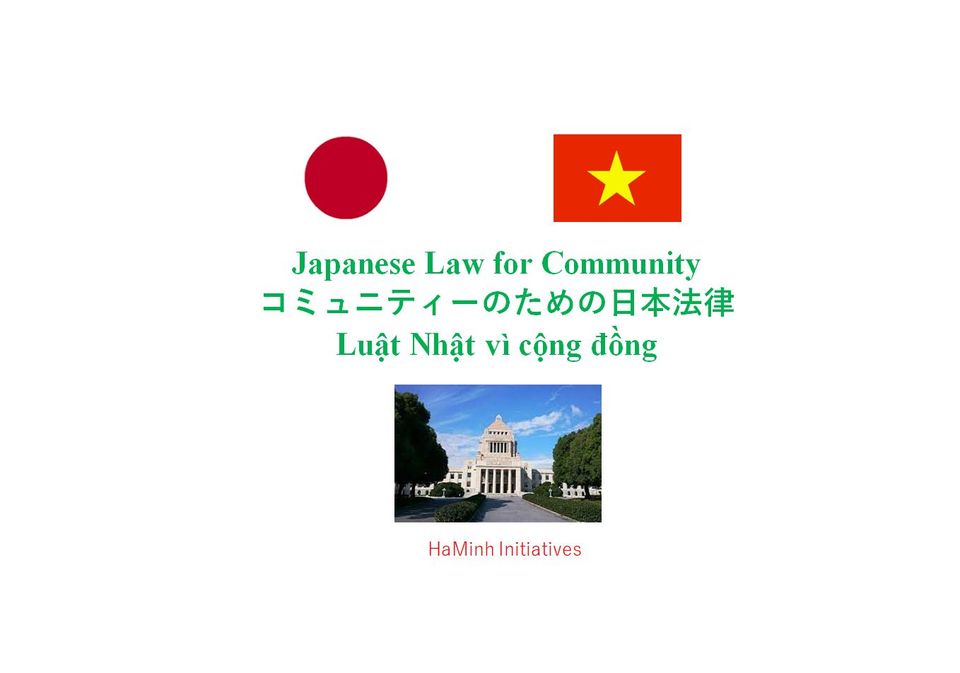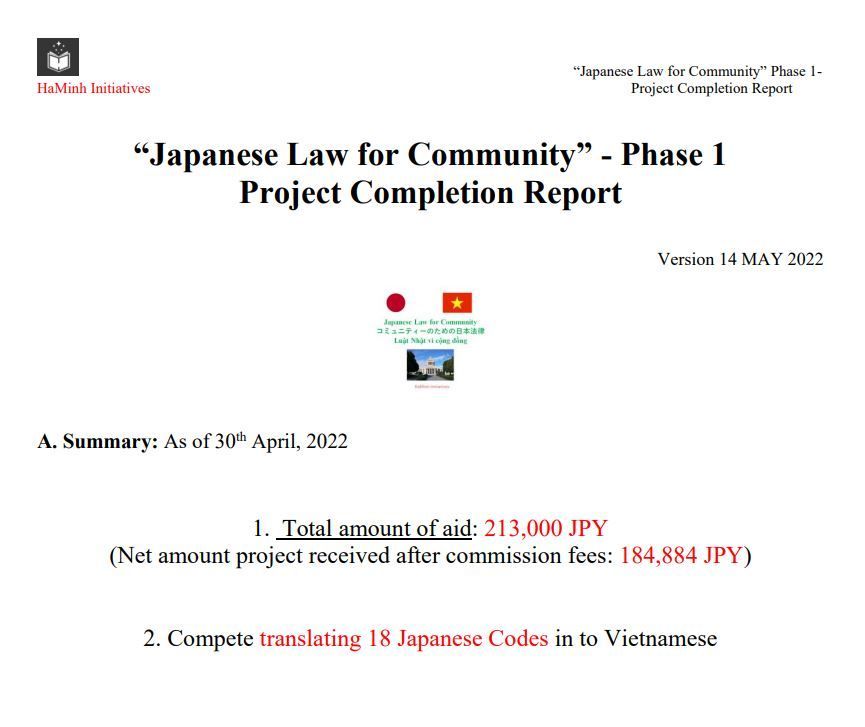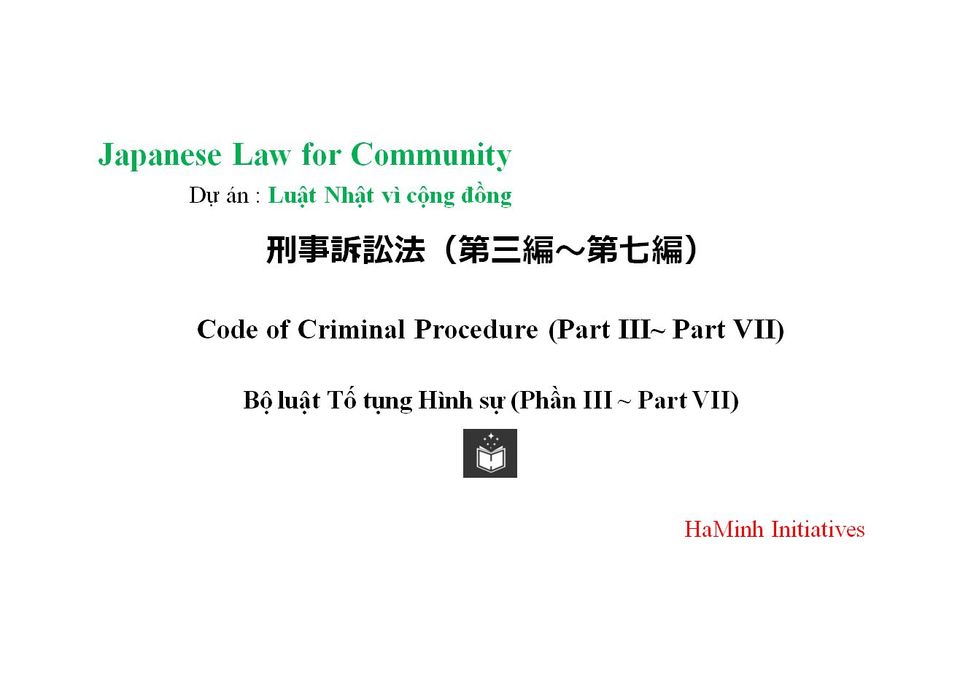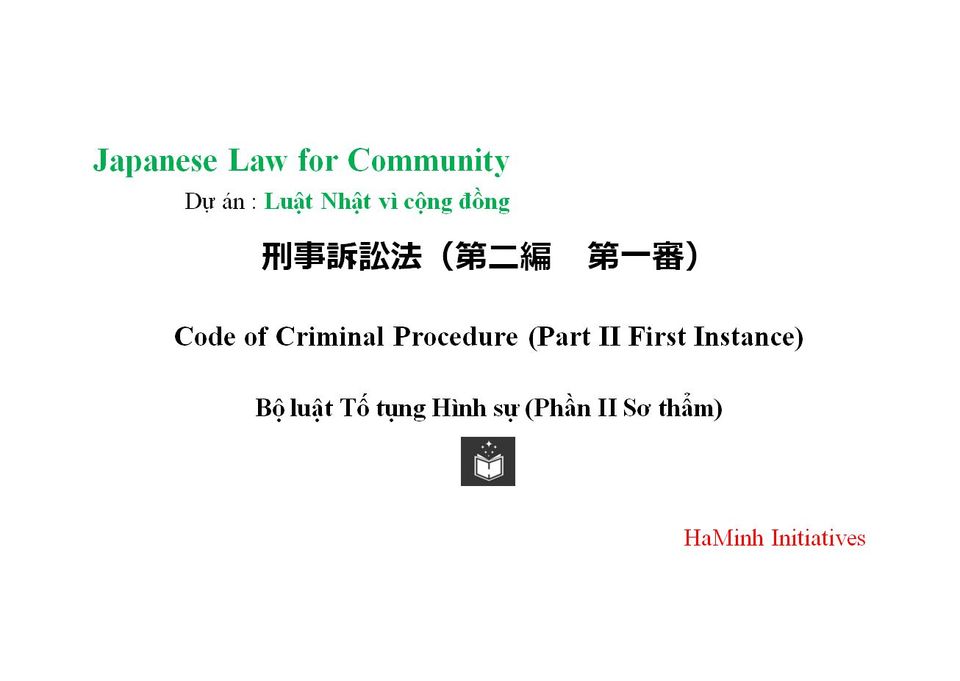I. Introduction:
Aiming to disseminate Japanese Law to Vietnamese living in Japan, "Japanese Law for Community" is a project translating Japanese law into Vietnamese and providing these at no cost.
• Project Summary: Translate major Japanese laws into Vietnamese and provide them to the Vietnamese community for free.
• Targeted codes: Refer to the attached table
• Implementation mechanism: The Project Coordinator raises funds and orders translation companies in Vietnam to translate those mentioned above targeted Japanese law.


About Copyrights & Disclaimers
II. Progress:
Currently, we have completed translating this Japanese law
A. Japanese Six Codes
1.刑法/Criminal Law/Luật hình sự
B. Labor Law Group
1. 労働基準法/Labor Standard Law/Luật Tiêu Chuẩn Lao Động
2.労働契約法/Labor Contract Act/Luật Hợp đồng lao động
C. Commerce & Transaction Law Group
D. Other
1. 軽犯罪法/ Luật tội hình sự nhẹ (No English Available)
III. Donating to 'Japanese Law for Community'
We welcome all individuals and organizations to contribute cash or other forms in the following ways:
1. Through Funding Platform:
2. Other:
My targeted plan, the project' translation cost if ordering translation companies


*Please note that the above-estimated amount is estimated from the market unit price of a major translation company, so there is a high possibility that the amount will fluctuate depending on the companies who actually place the order.
* Please note that the targeted law may change without notice depending on the fundraising situation and the result of fundraising by other methods.
* The consequence order in which the targeted laws are implemented, priority arrangements, etc. are to be decided at the discretion of the project coordinators.
IV. Our pledges
1. Transparency – Integrity
We are committed to transparency in revenue and expenditure by disclosing donation amounts and expenses. In addition, we will issue a final project report at the end of the project or at the end of the year (whichever comes first).
2. Effective - Professional
We are committed to using the resources received from the community to implement the project in the most effective way to ensure the best results. In the "Japanese Law for Community" project, we prioritize professionalism - focusing on speeding up and improving the quality of translated content through choosing reputable translation agencies and optimizing and streamlining the project operation process.
V. Project Background:
Due to the shortage of human resources due to the aging population and declining birthrate in Japan, the Japanese government accepts foreign workers, including Vietnamese. Even if there are border measures to restrict entry due to Covid-19 Pandemic, the number of Vietnamese residents surpassed South Korea in 2020, reaching about 500,000, ranking second by nationality.


Source: Japanese Ministry of Justice [1]
The breakdown is that the technical intern training and students ratio is very high at about 62%. Moreover, unlike China and South Korea, in the Chinese character area, most Vietnamese in Japan do not have high Japanese proficiency. Furthermore, English is lower than that of Filipinos and Brazilians.
Figure: Breakdown of Vietnamese in Japan (FY2020)


Source: Japanese Ministry of Justice [1]
As staying in Japan without much understanding of Japanese customs and laws, Vietnamese have been facing a lot of troubles. As a result, the number of Vietnamese crimes in Japan is increasing year by year, and it has already overtaken China and Brazil to become the number one by country.
Figure: Changes in the number of foreign arrests by country


Source: Chunichi Newspaper [2]
Also, because of lacking knowledge of Japanese law, Vietnamese living in Japan can not acknowledge the risk of committing illegal acts but their legal rights. However, understanding the law in Japanese is a very high hurdle, and even advanced Japanese learners who have been staying for many years cannot easily do it.
Therefore, recognizing that it is necessary to translate major Japanese laws into Vietnamese, I launched the "Japanese Law for Community."
[1] https://www.moj.go.jp/isa/content/001344904.pdf
[2] https://www.chunichi.co.jp/article_photo/list?article_id=227742&pid=931194
VI. My Message
Finally, this project can be expected to decrease the crimes of Vietnamese people in Japan who are increasing their presence. Moreover, Vietnamese living in Japan can live with peace of mind by knowing "what I can do" and "what I cannot do" in Japan, where the customs and laws are different from their home country.
By translating the law, it can be used and utilized by many groups and individuals in the future.
As an example, Japanese local governments and local governments guiding Vietnamese residents;
Japanese judicial translation, interpret.
Japanese law firms, accounting firms, etc. advise Vietnamese clients
Vietnamese student studying Japanese law,
Vietnamese researchers and policymakers study and investigate Japanese law, etc.
We only need to translate one time. The project will benefit many people for many years and will be of great benefit to both Japanese and Vietnamese societies.





